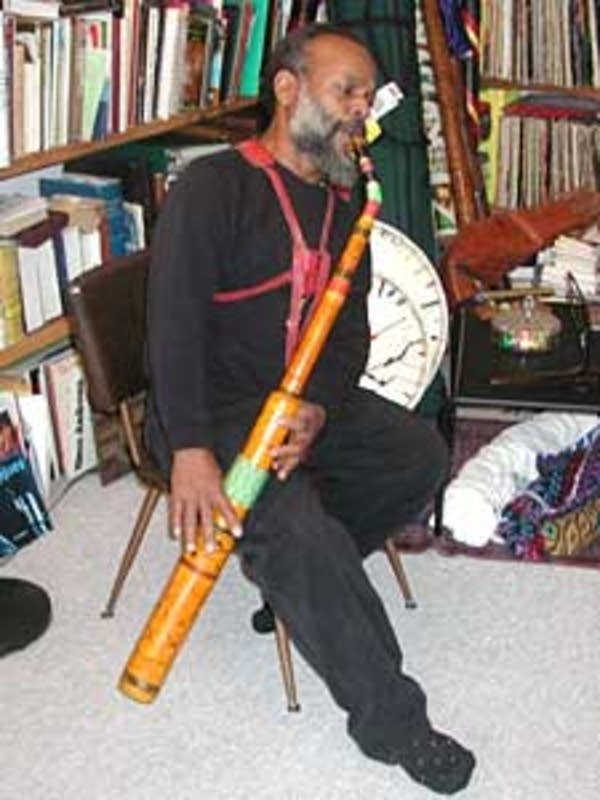Sustainable music
Go Deeper.
Create an account or log in to save stories.
Like this?
Thanks for liking this story! We have added it to a list of your favorite stories.

To Douglas Ewart, a wooden crutch is more than just a tool to support your body. It can also be a musical instrument. Ewart has turned crutches into drums, what he describes as stamping sticks, even chimes.
"I'm into using orthopedic crutches because they're well fabricated, very strong, and they're often just used once and then discarded," he says.
Douglas Ewart takes what some people might call a holistic approach to life.
In Ewart's view, the usefulness of things never ceases and waste is an unaffordable indulgence. It's a mode of living that was instilled in him as a child in his native Kingston Jamaica.
Turn Up Your Support
MPR News helps you turn down the noise and build shared understanding. Turn up your support for this public resource and keep trusted journalism accessible to all.
In Ewart's neighborhood, money was scarce. "As a result, people became ingenious at fixing things, extending the life of things," he says.
Ewart has experimented with designing and building things since childhood, when he created many of his own toys. That spirit of invention and self-reliance was reinforced when he became a Rastafarian and lived in a Kingston encampment for a year.
Ewart emigrated to the U.S. in 1963 to study tailoring, but that eventually gave way to a desire to be a musician. He says almost immediately he began to develop instruments to manufacture the sounds he heard in his head but couldn't duplicate. According to Ewart, the process didn't end there, because, he says, "once you build the instrument now you have to learn how to play it and to coax those sounds out of the instrument," he says.

Ewart's living room serves as a warehouse for some of the hundreds of instruments he's made over the years. Brilliantly colored didgeridoos, totem flutes, rain sticks, and assorted percussive instruments stand upright or lean against the walls, a few almost as tall as the ceiling. Some are made from clay or plastic, others from wood or bamboo.
Ewart reaches for a bamboo tube about two-and-a-half feet long and five inches in diameter, hand-painted and decorated with beads. It's wrapped so tightly in plastic he has to loosen the knot with his teeth. "I call it a bamboo peace chime," he says. "And my goal is to make about a hundred of them and I want to do a concert."

Ewart has made instruments out of skis and oars. His "cycle drum" consists of an old bicycle tire rim with a goat skin stretched across and fastened to the spokes.
There's also the Ewartophone, a tubular bamboo instrument with a saxophone mouthpiece that Ewart riffs on, Ornette Coleman-style.
With the exception of Ewart's screeching solos on that bamboo sax, many of his instruments emit sounds that give the listener a feeling of lightness, almost of being suspended. Ewart says that's intentional.
"You know we can levitate mentally, if not physically," he says, "and so for me, music should help us do that, you know music should makes us, help us float."
The Walker Art Center's curator of performing arts, Philip Bither, describes Ewart's work as a global musical village.
"He really draws on influences from his native country of Jamaica, from Africa, and certainly from the whole history of jazz in America," Bither says. "And so he weaves those influences together, to really take you on a musical journey."
Ewart says improvisation is at the heart of his music, but he and the musicians in his band The Inventions refrain from referring to it as jazz.

"We call it creative music or we call it great black music but never jazz. Jazz for me is a limiting term," he says. "I try to distance myself from it. The problem is people are always trying to pigeonhole you."
Ewart's outlook on jazz was strongly influenced by his involvement with the Association for the Advancement of Creative Musicians (AACM). The AACM is a Chicago organization formed in the 1960s that took on the mainstream jazz establishment for ignoring more experimental jazz musicians.
Over the decades he has traveled frequently from Minneapolis to Chicago to teach or conduct workshops. According to the Walker's Philip Bither, Ewart functions kind of like a midwest musical ambassador.

"Not only is Douglas one of our finest musicians and most important innovators," Bither says, "but he also serves, in who he is and how he's constructed his life, as a link between Chicago and Minneapolis."
For Ewart all these things, his AACM experiences in Chicago, his Rastafarian worldview, his Jamaican upbringing, have shaped the set of values he espouses as an artist and human being.
Heading the list, he says, is "self-determination, self-development, looking to one's self for the answers, knowing that you're capable of solving your problems."
Tomorrow night's concert at the Walker is a celebration of the 40th anniversary of the AACM. Douglas Ewart will be joined by several musicians from Chicago who make up his band The Inventions. They include such well-known reed players as Ed Wilkerson and Mwata Bouden. They don't play as an ensemble very often, so it's an event when they get together on stage.





